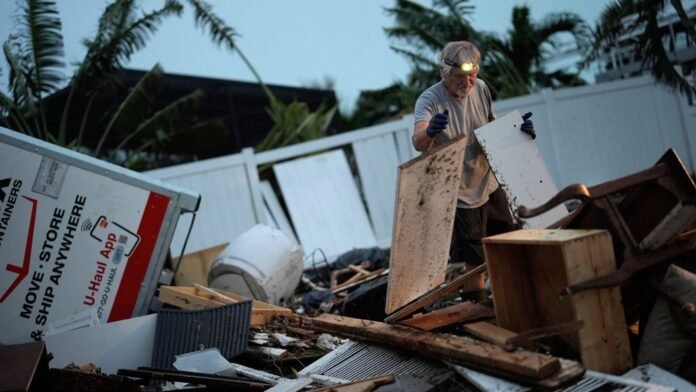Global sea levels are now rising twice as fast as they did last century, according to a major new scientific report.
The study – which takes a laser focus on climate change in the 2020s, a critical decade to stop the worst damage – finds all 10 measures are going in the wrong direction.
And most of them are doing so at a faster rate.
The findings are “unprecedented” but “unsurprising”, given the world continues to pump record levels of planet-warming gases into the atmosphere.
“We see a clear and consistent picture that things are getting worse,” said lead author Professor Piers Forster.
However, the rate by which emissions are increasing has slowed down, offering a ray of hope they will soon reach their peak.
Rising seas
The new study found sea levels are now rising on average twice as fast, at 4.3mm a year on average since 2019, up from 1.8mm a year at the turn of the 20th century.
The acceleration is stark, but within the realms of what scientists expected.
That’s because the warming atmosphere has sent more melting ice flowing into the sea, and the ocean water expands as it warms.
For the island nation of the UK, which risks coastal flooding, cliff falls and damage to homes and buildings, with 100,000 properties expected to be threatened with coastal erosion in England within 50 years.
Dr Aimee Slangen, from the NIOZ Royal Netherlands Institute for Sea Research, said: “The concerning part is that we know that sea-level rise in response to climate change is relatively slow, which means that we have already locked in further increases in the coming years and decades.”
A UK government spokesperson said: “We owe it to future generations to tackle the climate crisis, by becoming a clean energy superpower.”
They are also spending £7.9bn on flood defences to “strengthen our resilience” and protect thousands of “homes, small businesses, and vital infrastructure from this growing threat”.
Meanwhile, the amount of greenhouse gases the world can still emit while limiting warming to safer levels has plummeted by 74% – from 500 billion tonnes of Co2 to 130bn.
That leaves just three years’ worth of emissions in the budget if the world is to limit warming to no more than 1.5C above pre-industrial levels – the threshold widely agreed to be the best chance of avoiding very severe impacts.
The report, involving more than 60 scientists, also warned the world is warming faster than ever before, by an “unprecedented” rate of 0.27C per decade.
Read more:
Endangered rays, sharks and native oysters ‘could thrive’ despite climate change
Will there be a hosepipe ban in the UK?
Professor Forster later told Sky News: “There is little good news across the entire indicator set.”
“This is why I don’t have my normal optimism.”
He added: “Greenhouse gas emissions needed to have started dropping significantly in 2024 if we were to keep a chance of keeping long-term warming below 1.5C.
“The world has failed to do this.”
Change is possible
Scientists urged leaders to draw up more ambitious national climate plans before the COP30 climate summit in Brazil in November.
“In a rapidly changing climate, evidence-based decision-making benefits from up-to-date and timely information,” said the study, Indicators of Global Climate Change 2024, published today in Earth System Science Data.
Dr Valérie Masson-Delmotte, from Institut Pierre Simon Laplace, said: “What happens next depends on the choices which will be made: it is possible, by sharply reducing greenhouse gas emissions, to limit the magnitude of future warming, and protect young generations from the intensification of extreme events.”









